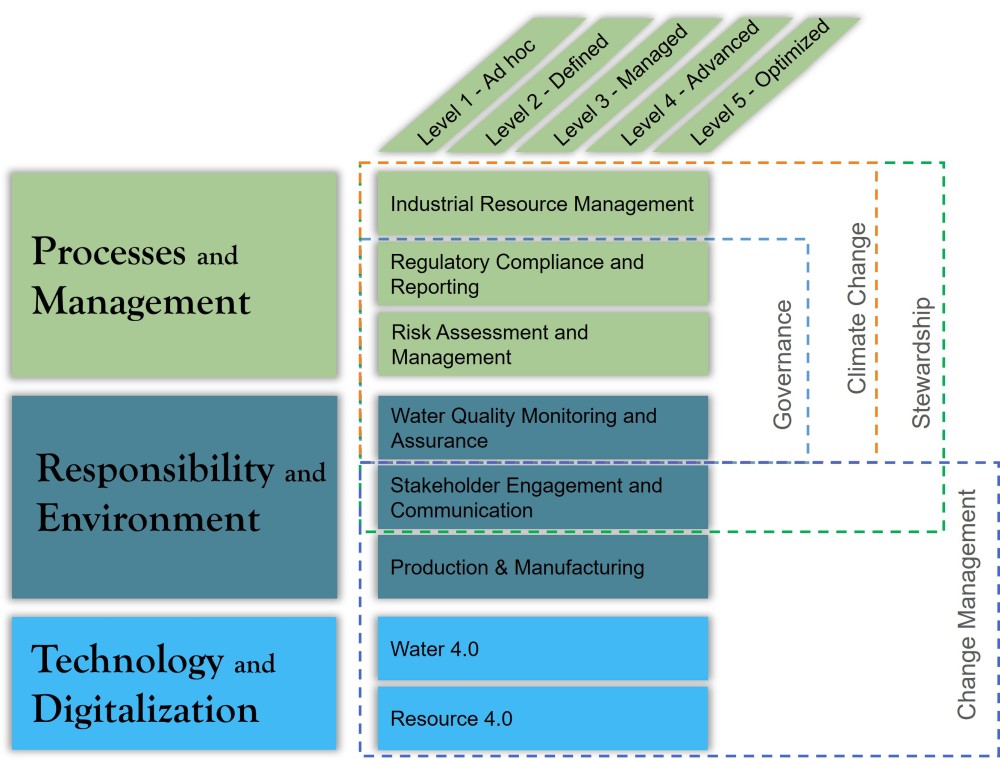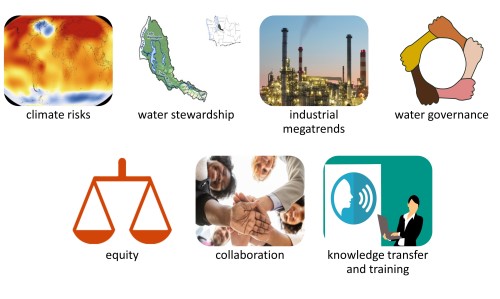Assessment and Maturity Improvement
Investments in Climate-Neutral and Circular Economy processes will amount over €1 trillion for the next decade. Additionally, the EU countries have committed to leading the green digital transformation. Digital technologies will be used to raise industrial efficiency by reducing the consumption of resources, closing material loops, and initiating new business opportunities. In various projects conducted by DECHEMA, we have noticed an abundance of initiatives, technologies and methods for approaching the future industry. But we also noticed a lack of frameworks and guidance to build a clear roadmap.
The three main components for industrial water management
The maturity improvement plan is an individual roadmap with five clear defined steps. For a radical transition we considered the strong interdependence of people, technology and environment. We think that a future oriented industrial water management lies in the components processes, responsibility and technology.
- Processes describe the entire organizational structure and optimizing it’s technical, operational, and legal processes. This may involve various inputs such as materials, information, or human effort, and may produce a range of outputs, such as products, services, or information. Effective process management must supports the organization's goals and objectives.
- Responsibility describes the assurance and extended commitment for the environment throughout the production chain, including sourcing, transportation, and waste disposal. Embracing environmental responsibility can create positive impacts while also improving the bottom line.
- Incorporating technologies. Data-driven innovation allows for transparency and value stream disclosure, potentially reducing operational expenses by up to 90 percent (Forrester). Furthermore, their integration into corporate strategy can mitigate water-related risks and improve sustainability practices.

[Maturity improvement plan with five maturity stages and cross-cutting issues]
Die Komponenten Prozesse, Verantwortung und Innovation werden in eine Reihe spezifischer Kriterien unterteilt. Jedes Kriterium entwickelt sich über die fünf Reifegrade von Level 1 - Ad hoc bis Level 5 -
The three components’ processes, responsibility and innovation are further subdivided in a set of specific criteria. Each criterium is progressing across the five maturity levels from Level 1 – Ad hoc to Level 5 – Optimized. For these specific criteria, the organization must determine their current level of maturity and identify the steps necessary to progress to the next level. This allows for a structured approach to improve processes, increase accountability and foster innovation within the organization. The ultimate goal is to achieve Level 5 – Optimized for all criteria, indicating a highly efficient and effective organization.
The added value by DECHEMA
The plain i²WM is a customer oriented perspective. Penetrating the three components processes, responsibility and technology, you will find cross-cutting themes. These open up perspectives for further opportunities. This is where our interdisciplinary expertise unfos:ld

By committing to a culture of change, this Maturity Improvement Plan provides a blueprint for organizations to continually progress their operations and stay competitive in today's rapidly evolving business landscape.


